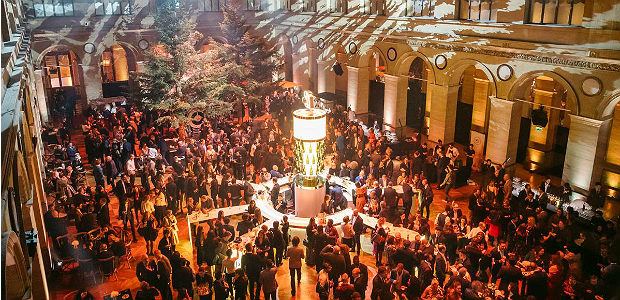The World Restaurant Awards held their inaugural awards ceremony last night in the city where restaurants first started, Paris. The overall winner was none other than SA’s own Kobus van der Merwe for his restaurant, Wolfgat in Paternoster. We couldn’t be prouder right now!
Wolgat (a 130-year-old cottage and cave on the beach in Paternoster) is also number 4 on the Eat Out Awards 2018 list.
The staff (most of them women) have no formal training and there’s no kitchen hierarchy, Kobus told AFP, “we all do everything. If you pick something you prepare it yourself and maybe then take it to the table and explain it to the customers.”
He followed by saying, “I don’t feel worthy. It’s a big title. My staff who go out every day gathering herbs, succulents and dune spinach, should be here… It’s their baby. I can’t wait to celebrate with them with a big glass of South African sparkling wine.”
The Michelin guide was the first to pit restaurant against restaurant in the early 20th Century when it launched its first restaurant guide book. The book’s goal was originally to entice the French to jump into their motorcars and zoom across the countryside in search of a stellar lunch. The result however, was to be the generation of a high stakes game of winners and losers on a never-ending annual awards circuit.
Throughout the world of fine-dining we find awards schemes – on one hand recognising and congratulating chefs and servers on a job well done, while the losers face potential ruin as the bookings dry up and the talent moves elsewhere.
ALSO READ: French chef can’t seem to shake off his Michelin destiny
In South Africa you may be familiar with the Eat Out Restaurant Awards hosted annually, but across the globe there are also the James Beard Awards, Michelin Guide, The World’s 50 Best and Conde Nast Traveller Awards. Add to the pot a strong dose of online review sites a la TripAdvisor and a large sprinkle of social media, and what you’re left with is a swirling mess of vicious competition.
Restaurant awards in many different countries are increasingly attracting criticism for their eurocentric values, where modern French cooking is still lauded as the exemplary form of restaurant dining. Journalists (including this one) has noted the lack of diversity in both gender and race among the award winners, both in South Africa and abroad. The awards inevitably, and predictably, go to the most expensive and most outlandish dining experiences that are accessible only by an elite few.
Creative director of the World Restaurant Awards (curiously, also the co-founder of the World’s 50 Best Restaurants) Joe Warwick, said of the awards: “Expect The World Restaurant Awards to be conducted with complete integrity and make everyone think about the full gamut of the world’s great restaurants – old and new, from luxury destinations to humble institutions – and what makes them so special”
It appears that Warwick and his team have attempted to refurbish the awards platform. Here are 5 ways that the World Restaurant Awards are breaking the mould:
1. Shaking up the judging panel
Unlike most restaurant awards who insist on a faux veil of anonymity, the World Restaurant awards have clearly and deliberately published the names and faces of their judging panel.
The judging panel itself has a diverse mix of backgrounds made up of chefs, restaurant owners and members of both print and digital media. Of the 100 judges, 50 are women including representatives from South America, Africa, Asia and Australia.
A few stars on the judging panel include South Africa’s Margot Janse, Clare Smyth, Brian McGinn Executive Producer and a Director for Netflix’s CHEF’S TABLE, Kylie Kwong, Massimo Bottura, David Chang, Yotam Ottolenghi, Dan Barber and René Redzepi.
2. The awards don’t take themselves too seriously
With the inclusion of awards categories such as Tattoo-Free Chef of The Year (awarded to Alain Ducasse), the panel sent a very loud message: we don’t take ourselves too seriously and neither should you. The Tweezer-Free Kitchen award is presented to the restaurant that takes a simpler and more hands-on approach to plating, taken home by Bo.Lan of Bangkok, Thailand.
3. A holistic approach to the industry
While other awards tend to focus on the food and the blazing glare of the chef’s celebrity, the awards categories reflect a more well rounded definition of what a “successful” restaurant is. The Atmosphere of the year was awarded to Vespertine (USA) for their “commitment to adding flavour to service, acoustics, ambience and more.” while the Ethical Thinking award (given to Refettorio, Italy) recognises social responsibility, staff welfare, sustainability practices and community engagement. Refettorio is headed up by Massimo Bottura of the world-renowned Osteria Francescana in Modena.
4. The restaurants lauded here are not just for the super rich
Perhaps my favourite award of the evening was the No Reservations Required award, given to the restaurant that “represent accessible, affordable, democratic dining choices”. At last, the everyday restaurant gets recognition. This year’s winner was Mocotó (Brazil).
5. Honouring longevity
In an industry where cutting edge techniques and quirky creativity are highly prized, it was interesting to see a category (Enduring classics) reserved for establishments that have been operating for more than 50 years.
See all the winners of the World Restaurant Awards.
Read Seth Shezi’s review of Wolfgat Restaurant on EatOut.co.za
Headline image via World Restaurant Awards Facebook

